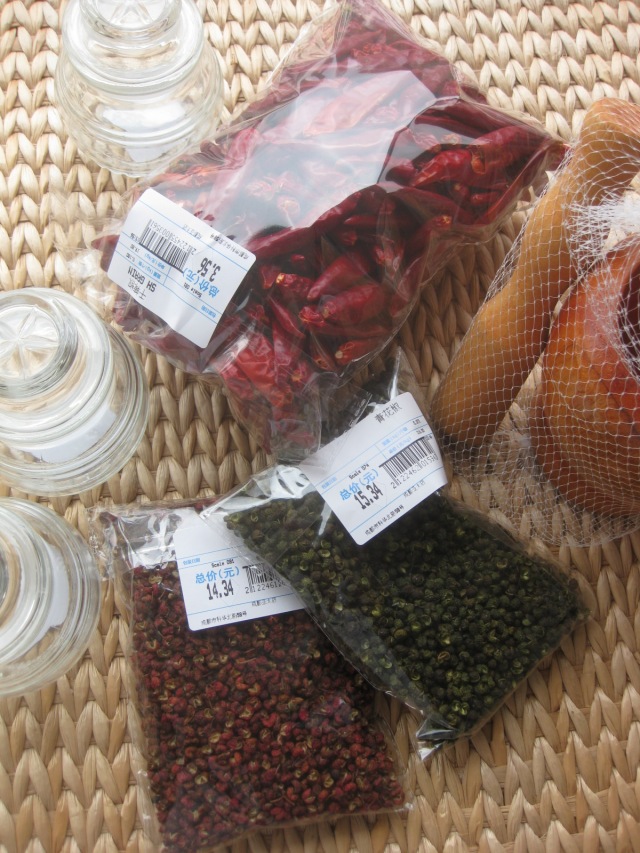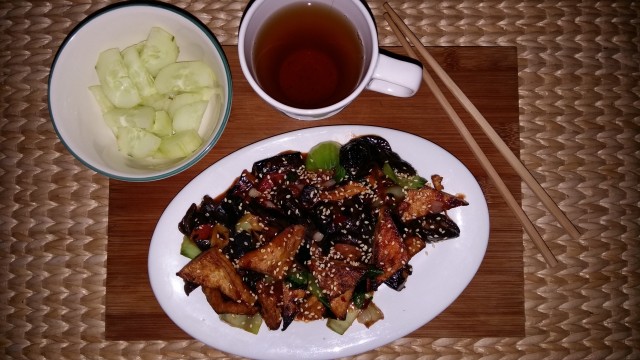Thursday, October 13th, Day 28
Got a call from my daughter and son as I was getting ready to go to my first Mandarin Chinese lesson. It’s great to hear from family! Thank you!
I’ve passed this sign by the elevator window at least 100 times, but only stopped to read it today. I’ll have to look up the Chinese to see what they’re talking about. What is a high-altitude safety parbolic? And why isn’t there one?

My first Mandarin Chinese language lesson was to start at 10 a.m. at Sichuan University’s Training Center of International Chinese Teacher. I made the walk in 10 minutes, arriving at 9:55 a.m. I was led to a classroom where I met my teacher, “Jenny” (her English name). The lesson was one-on-one, and she had filled a large dry-erase board with phrases written in Chinese characters and pinyin.

We introduced ourselves, talked a little about what I wanted in my lessons, and then she had me sit down.
“Today we are going to study the phrases for using ‘di di da che.'”
I had no idea what she was talking about, so she showed me. ‘Di di da che’ is a cell phone application, the Chinese version of Uber, for paying people for rides in their cars.
“‘Che’ means car,” she pointed out. “‘Da che’ means taxi.”
As I tried to pronounce the words using the pinyin spelling, she quickly realized I didn’t know the proper pronunciation of pinyin. We spent a long 1/2 hour with her going through most of the common consonant and vowel sounds.
Overall, I would guess that 60% of the sounds in Mandarin are very similar to the English / French / German sounds I already know how to make. The teacher was impressed when I knew how to pronounce the German ü (which I pulled out of my memory from the 1st-year German class I took in Belgium when I was 16 years old and learning French). Of the remaining 40% of the sounds, about 30% I can hear the sound but my mouth, tongue, throat, lungs will need some practice to able to make the sound. The worrisome part is the 10% of sounds that I cannot even hear. For a couple minutes she repeated sounds like ‘x’, ‘c’, ‘s’, and ‘z’, and I could not hear any difference.
“It’s okay,” she encouraged. “You’ll get them.”
I shook my head, uncertain I ever would.
“The goal is to be able to communicate, isn’t it? Not speak it like a native,” she offered.
And she is right. I’m just such a perfectionist that I hope my fear of not getting it right doesn’t keep me from trying.
The lesson continued, with me learning the pinyin and pronunciation for words like ‘software market’ (ruanjian shangdian), and ‘search’ (sou suo), ‘download’ (xia zai), ‘install’ (an zhuang). The clock rolled around to 11:30 a.m., the end of my scheduled lesson.
“Do you have more time?” she asked.
“I have the whole day,” I said, joking.
“Good. Then we’ll go out and try what you’ve just learned.”
“What?” I asked, a quickening fear confirming what I thought I had heard.
“Come on,” she waved as she went out the door. “We have to get a taxi.”
I have to say this lady has what it takes to get me to learn this foreign language. We were out by the busy street in 5 minutes, had used her phone to order a car, and were picked up in about 1 minute.
During the drive she showed me the price, distance and time to our destination, the driver’s picture as well as his license plate number. We arrived at Tianfu Square (the same place I walked to last week). We got out, she closed the door, and the car drove off.
“I didn’t pay,” I said.
“All paid, automatically, on my phone,” she said.
“Then I owe you 10 yuan.”
“Don’t worry about it,” she said.
“Well, at least I can pay for lunch,” I said, amazed at how everything had been done using her cell phone.
We talked a little about cell phone usage. I mentioned that I saw the vast majority of shoppers just holding up their cell phones to the store clerks, who scan a picture of a bar code, which approves a purchase directly against their account. Jenny said she hardly ever carries cash around any more, charges everything on her phone. Looks like China just jumped right past debit cards to e-payments.
We walked along the street, looking for a place to eat. She’s worried about getting lost, apologizes for not knowing her way around. She has been in Chengdu for only a couple months, leaving her home town in northern China to seek better opportunities. She is self-taught in English, from watching movies and reading, got a tourism degree in college, and went to work in the tourism office in her home town. But it wasn’t challenging enough, and she didn’t really get to use her English. So she left home, left her job, enrolled in the Chinese Teacher program at Sichuan University. She wants to meet more people from around the world. I don’t have any doubts that she will succeed. Her determination and independence were familiar to me, shared values with my American upbringing, and I didn’t get the impression that she had adopted Western values. I think hard work and determination are part of the values in common between American and Chinese peoples.
We found a little alley crowded with people, tables lining both sides, with lots of little lunch spots. I watched two monks, wearing purple robes over their orange robes, walk in to a place on the right.
“Let’s go there,” I said, assuming the monks knew where to find good vegetarian meals.
We sat down at one of about 10 small tables. The menus were one page, front and back, laminated. No English here. Jenny called over a waitress. I scanned the prices: from 7 to 13 yuan. I looked around, saw some pictures up above the menus on the wall, was interrupted.
“You eat eggs?” Jenny asked.
Jenny was spending a long time negotiating my meal, over five minutes. I thought the poor waitress was having to work pretty hard for a 13-yuan meal. It finally got worked out and our waitress disappeared into the kitchen.
“You’re having rice noodles with vegetables and eggs.”
She pointed to the picture of my meal up on the wall.
“I asked for three quail eggs, at 2 yuan apiece. Is that okay?”
“Sounds great!” I said. “What are you getting?”
“I haven’t ordered, yet.”
I tried not to let my jaw drop too far. I hoped she was going to be able to order before my food came to the table.
“We can share,” I said, then added as Jenny searched the room, “The waitress is gone.”
Jenny called to another waitress, who came over and pointed to the kitchen. Jenny seemed upset. The second waitress stayed and took Jenny’s order. It didn’t take long, and the waitress yelled out the order, over the heads of everybody in the restaurant, in the loudest diner voice I have ever heard.
“This is the real China,” Jenny said, perhaps noticing me wince when the waitress blasted.
It was the real deal, for sure. I watched as the dishwasher worked out in the gutter, cleaning what very well could be our dishes. Time to test my resistance to anything that might be crawling around in the street.
Our meals were great! So many flavors, textures, slurping sounds as I tried to eat the noodles by sucking without breaking them.
“Longevity,” Jenny told me. “The longer the noodle, the longer your life.”
I sucked on a noodle, having to exhale twice to be able to keep sucking, until I couldn’t fit any more noodle in my mouth. I might die choking on this longevity noodle!

Jenny went to the next table and came back with two jars. One had hot pepper oil, darker with a smokey flavor. The other was bright red pepper paste. I preferred the oil, and put enough on my dish that Jenny noticed.
“You like spicy?” she asked.
“I love spicy!”
“Me too,” she said. “It’s not like this where I come from.”
After the peppers started to do their thing to our mouths, Jenny reached over to what I thought was a napkin dispenser, pulled out the thinnest napkin I’d ever seen, then blew her nose. Turns out what I thought were napkins were really for runny pepper noses! And before long, I needed one, too.
Jenny taught me the phrase for “no want meat”:

My language lesson didn’t end until 1:30 p.m., after 3.5 hours. We’ll see on Saturday if that counts as just one lesson. I asked Jenny if she was paid to give these lessons. She said, no, but that it was a good way to practice what she was learning in school. And she said she learned some English, too. She had asked me the difference between a shop and a store, the correct pronunciation of several words. I also pointed out that what she called an A-P-P, was really an “app”, short for “application.” She said the Chinese called it an A-P-P, and always wrote it in capital letters.
I got dropped off by another “di di da che” close to my apartment as Jenny went back to the University for another tutoring lesson. I passed this store on the way. I like the name. It’s a tanning salon.

On my way home I stopped by Wal-Mart and bought a mortar and pestle, along with some spices to grind, including the famous Sichuan tingling spice, huajiao.

Threw together a quick deep-fried tofu dinner, you know, just something I whipped up from whatever I had in the kitchen 😉 Served it with cucumber in sweet and sour sauce and jasmine tea.


haha, so interesting